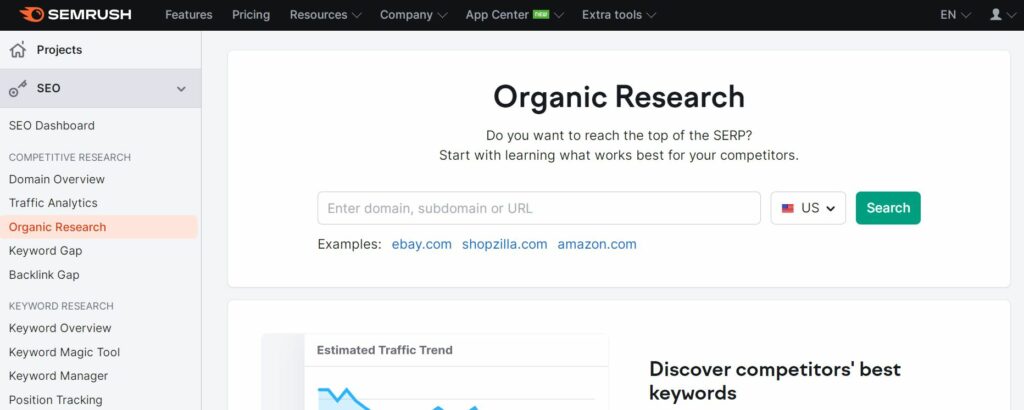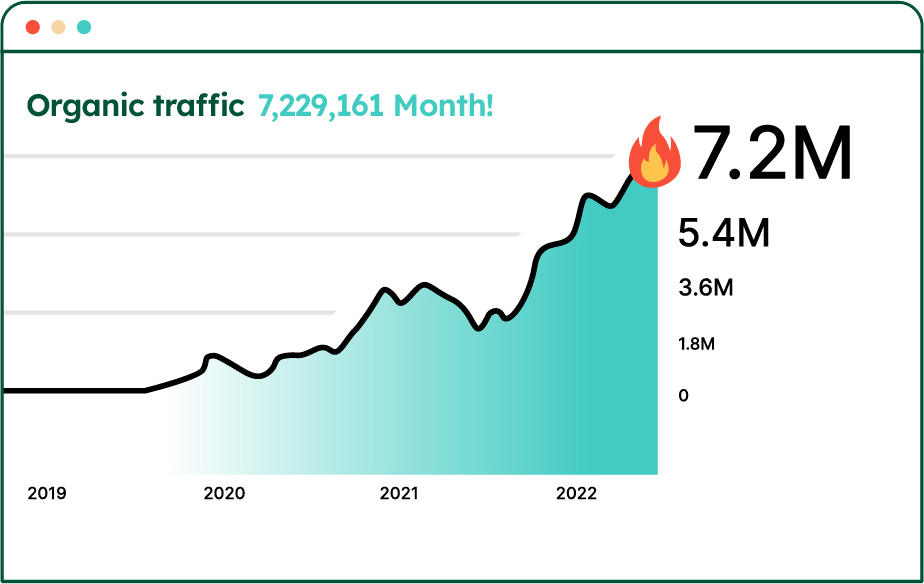Organic keywords are kind of like fishing lures – you want to use the right one to attract the right fish (or in this case, the right audience).
And just like an experienced fisherman carefully chooses the lure based on the type of fish they are trying to catch, you need to select the right organic keywords to attract your target audience.
By targeting the right organic keywords, you can hook the attention of search engine users and reel them into your website.
But how do you find the right organic keywords to use? And how to include them in your content for the best Search Engine Optimization (SEO) results?
We’ll cover all of this and more below.
Let’s dive in!
What Are Organic Keywords?
Keywords are phrases people type into search engines to find information, products, or services of interest.
Unlike pay-per-click (PPC) keywords, where you need to use paid marketing campaigns to rank, organic keywords attract free traffic from search engines like Google. In fact, they are a key component of any long-term Search Engine Optimization (SEO) strategy.
SEO & Organic Keywords
When it comes to SEO, optimizing your content around organic keywords is one of the crucial steps to drive more organic traffic to your website. And organic traffic is the holy grail of digital marketing because it provides the best Return on Investment (ROI) for most websites.
When you use organic keywords and optimize your content around them, you can write about what people search for the most on your website.
For example, if a considerable amount of people search for “chiropractic adjustments,” and you are a chiropractor offering this service, you should have a blog post explaining in detail what chiropractic adjustments are, how they work, and what benefits people get from these procedures.
That way, your blog post can appear in search results, drawing people to click on and read it. If they like the content, they may stick around and explore what more you have to offer.
They may even decide to book a chiropractic adjustment because of your content.
And that’s the beauty of organic keywords – they attract targeted and engaged readers.
Using organic keywords to build valuable and engaging content may attract more website visitors. In turn, this organic traffic can improve how search engines view your website. That’s because steady organic traffic signals that your website is useful and relevant to users, and search engines reward that with a higher ranking.
With people and search engines trusting your website more, you can build your credibility and increasingly become an authority in your niche.
5 Ways to Find Your Top Organic Keywords
Finding the best organic keywords is crucial for any business looking to attract its target audience to its website.
There are so many customers out there searching for what you have to offer – all you need to do is find the right keywords to show up in their search results.
Here are the top five ways to find the most relevant organic keywords for your business:
#1. Do Organic Keyword Research
Before you can optimize your content around the most important and relevant keywords in your niche, you must first identify those keywords.
The first step to do that is through organic keyword research.
You may think you know your audience and their needs, but many business owners are surprised to find what their potential customers search for on search engines. That’s why simply guessing what keywords to include in your content is not enough.
Instead, you need to use a keyword research tool like Google Keyword Planner, Ahrefs, or SEMrush to help you find the exact topics that your audience searches.
These tools provide a range of features that can help you in your organic keyword research. For example, you can find organic keyword search volume data, click-through rates (CTR), ranking difficulty, information about your competition, and other important data.
That way, keyword research tools help you identify organic keywords with high search volume and low competition, which is a goal for online businesses.
However, keep in mind that today’s digital marketplace is highly competitive, and most high-search volume organic keywords have a lot of competition.
That’s why most businesses target long-tail keywords. These phrases are longer and more specific, which is why they typically have less search volume. However, they are also less competitive and bring highly targeted traffic to your website, which could help your business grow.
#2. Use Google Analytics
Google Analytics is a free web analytics tool by Google that tracks and analyzes your website traffic. It provides valuable insight into your user behavior, organic keywords performance, demographics, and other metrics that can help improve your SEO efforts.
You can use Google Analytics for organic keyword research by looking at the Organic Search report in your dashboard. To do that, simply click on “Acquisition” > “All Traffic” > “Channels” > “Organic Search.”
Keep in mind that some (if not most) of the organic keywords displayed in this report will be hidden because Google wants to protect its users’ privacy. So, you’ll see “not provided” instead of a specific organic keyword.
You can overcome the “not provided” issue with tools like Ahrefs and SEMrush.
That way, you can get a list of keywords along with traffic volume, traffic share, impressions, and other data. These valuable metrics can give you an insight into what keywords are performing so that you can adjust your SEO strategy accordingly.
#3. Leverage Google Search Console
Google Search Console is a free tool that helps you monitor your website’s performance in Google search results. This tool allows you to analyze your SEO, diagnose technical issues, improve rankings, and boost search engine visibility.
In addition, Google Search Console provides a detailed report on all keywords that refer organic traffic to your website. You can check the number of clicks and impressions, positioning, click-through rates, and other important metrics for each keyword.
To do that, you need to log into your Google Search Console, open the ”Performance” section, and click on the “Queries” tab.
That will give you a list of keywords you can then sort or filter based on your needs and goals.
For example, if you’re trying to attract more customers to your local chiropractic clinic, you can sort the organic keywords by location. That can help you identify the most successful and relevant keywords, which you can use to better optimize your content and attract more visitors to your website.
#4. Use Keyword Research Tools
It’s hard to imagine doing organic keyword research without using any dedicated tools. Luckily, there are plenty of SEO tools that can help you identify the most relevant organic keywords, with SEMrush and Ahrefs being the two most popular.
SEMrush and Ahrefs are all-in-one SEO tools that can help you with everything from organic keyword research to competitor analysis and backlink tracking. That said, it’s important to mention that both options have certain unique features and strengths.
For example, SEMrush is a robust keyword research tool that allows you to track the performance of your existing keywords and find new ones. With SEMrush, you can get valuable insights into keyword search volume, difficulty, cost-per-click (CPC), and other metrics.

Analyzing this information is vital to determine which organic keywords to target.
On the other hand, Ahrefs is mainly known for its powerful backlink analysis. However, it also has the option to research keywords to determine search volume, difficulty, and related keywords.
In addition, Ahrefs has a cool feature called “Clicks,” which allows you to see how many times users actually click on a link when searching for a certain keyword. That way, you have another metric to help you determine which keywords are the best for your business.

Overall, both SEMrush and Ahrefs are excellent organic keyword research tools that can help you make a more informed organic keyword strategy to improve your SEO.
#5. Check Your Competitors’ Organic Keywords
It’s always a good idea to see what your competitors are ranking for to get the hang of what’s working and what’s not.
It’s easy to get tunnel vision and focus solely on one way to find organic keywords. That’s why checking your competitors can help you identify potential gaps in your SEO strategy and adjust accordingly.
In addition, keeping an eye on them allows you to stay on top of new trends in your industry. So, when user behavior or preferences change, you are able to adapt your SEO strategy and stay ahead of the curve.
You can manually search for keywords and analyze the websites of your competitors, but the easier way is to use SEMrush or Ahrefs.
These tools are a great way to get a list of organic keywords your competitors rank for. That way, you can start creating your own content that outshines them and brings more visitors to your website.
How to Optimize Your Site for Organic Keywords
Once you’ve identified organic keywords you want to use, it’s time to optimize your content and website around them.
To do that, you need to ensure that your chosen keyword appears at the right place on your page. That includes:
- The URL
- Your website title
- The meta description
- Your article’s introduction
- The header
- Some subheaders
- Your images’ alt text
- Anchors for links pointing to that page
By including your keyword in these elements, you signal search engines that your page is relevant to that keyword. This helps them understand the purpose of your content, which is vital if you want to rank high in Search Engine Results Pages (SERPs).
It’s important to mention that keyword density doesn’t really matter. You don’t need to mention your keyword a specific number of times to start ranking for it. In fact, the best idea is to focus on creating high-quality and informative content and include your organic keyword naturally, where it makes sense.
You should also use variations of your main keyword throughout your content.
These phrases may differ slightly from your target keyword but are still associated with it and people search for them. Including such keyword variations can help you rank for them without having to create separate content for keyword variations.
For example, if you are a chiropractor looking to optimize your blog post for the keyword “chiropractic adjustments, ” you want to include variations like “chiropractor adjustment” and “spinal adjustments.” Doing this will extend the reach of your primary keyword and help you get in front of people who are searching for a different, but still topically relevant, keyword.
Lastly, you want to check the already existing content on your website and optimize it for organic keywords. In fact, updating your content regularly is a great way to ensure search engines continue to trust your website.
Key Takeaways
And that’s a wrap on organic keywords. Before you start applying all our tips, let’s go over some of the main points we covered in this article:
- Organic keywords are phrases that people search for online and that attract free traffic from search engines.
- Organic keywords are vital for your SEO strategy because they can improve your search engine rankings and your website’s online visibility.
- You can find your top organic keywords by doing organic keyword research or checking what keywords your competitors are targeting.
- For the best organic keyword research results, you need to use tools like Ahrefs, SEMrush, Google Analytics, Google Search Console, or others.
- To optimize your page for an organic keyword, you need to use it in your meta titles, URLs, meta descriptions, subheaders, intros, image alt texts, and anchors of links pointing to that page.
- You should keep an eye on your organic keyword performance and regularly adjust your SEO strategy for the best results.





